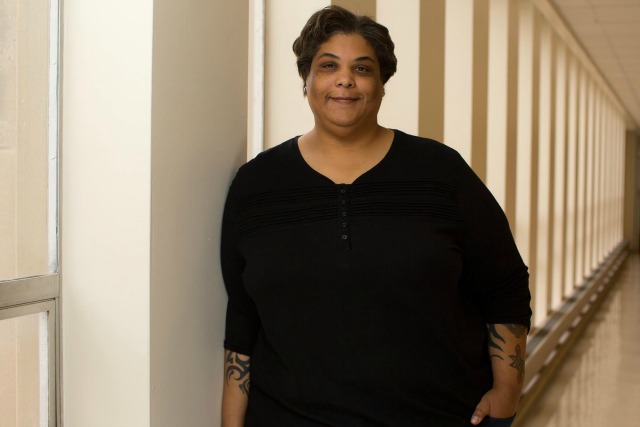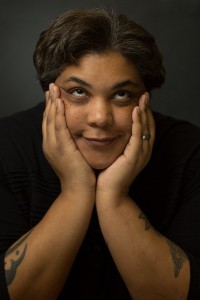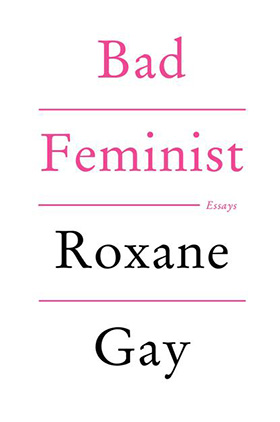Roxane Gay Speaks About Feminism, Twitter, Trauma And Beyonce
By Jaclyn Bauer in Arts & Entertainment on Sep 3, 2014 3:00PM

Roxane Gay’s reading and Q&A at Women and Children First last Wednesday drew in a crowd that could barely fit in the modest Andersonville bookstore. With the first attendees showing up well before 6:30 p.m., people were not only sitting on the stage beside Gay, but huddled and curled around tightly packed book shelves as well.
Gay, so seemingly settled and relaxed, so nonchalant and open with the audience, felt more like an old college friend than a famed feminist writer. She swore, bashed both the famous and parochial, discussed topics from rape to Sweet Valley High, and offered literary and political musings, cultural commentary and advice to everyone present.
She opened the evening by reading live tweets that she sent while reading the September Issue of Vogue, famed for its heft in size and advertisements. You can check out her tweets here.
Gay went on to read a selection of essays from one of two books she published this summer, Bad Feminist, which was the central axis point in conversation for the entire night. The one topic that, despite the range of talking points, kept resurfacing and is the crux of Bad Feminist, was the idea that feminism is flawed but still inherently necessary and vital in our contemporary age.
After reading, Gay answered questions on feminism, Beyoncé, tragedy and writing. Below are her responses.
On the difficulty of having opposing opinions within a movement:
“I think that as a culture we are looking for sound bites and it’s difficult: people find it difficult because they’re too lazy to hold more than one position at the time, or to accept that things are flawed and imperfect. We want everything to be what we need all the time, but that’s just not the way the world works.”
On Beyoncé’s performance at the VMA’s:
“You need to ask me a real question. Did I watch our queen, give us a performance? I transcended this plane and I am no longer able to hear Beyoncé criticism. In fact I’m going on NPR on Friday to talk about all the Beyoncé feminism haters: they’re going to get theirs. And I’m also writing about it for Vogue.
"A 33-year-old woman put the word feminism on national television on MTV, on a channel that plays the 'Blurred Lines' video. Young Girls saw that and understood that if you want to be cool like Beyoncé it’s okay to own feminism. So if you have anything negative to say about Beyoncé’s feminism, I can’t see you.
"But I also think that discussing 'is she or is she not a feminist?' is the stupidest conversation I’ve ever hear in my life. Because you know poverty is still going to exist tomorrow, whether or not Beyoncé is a feminist or not. I don’t care if celebrities are feminists, but I do worship at the altar of Beyoncé. She can be as fine as she wants to be. And that’s [being] a Bad Feminist."

On the conflation of feminism with sexiness and the disconnect between the two:
"I don’t think there’s a disconnect. There’s only a disconnect if you identify Beyoncé as the only source of feminism for these young women. So what we have to do as educators is teach our students about the broader movement. What Beyoncé is doing is just opening the door. I mean come on I’ve seen the Partition video. I don’t think that she’s saying that owning your sexuality is feminism, but for a black woman to be married and to own her sexuality and say 'yea you know what we are doing it every night and we are fucking up the Warhol.'
"I think that is amazing and I think that is truly groundbreaking, because all too often the sexuality of black women is demonized and here is a woman who is owning it. And we rarely get to see the intact black family, even though they exist. I just think that when people say 'oh she is just promoting sex,' people are being short sighted.
"She is doing so much more, but what you do is use the door that Beyoncé is opening and use that to introduce your students to Bell Hooks and the wide range of feminist thought that is out there so they understand that feminism does not begin or end with Beyoncé. She’s just one woman being a feminist, but here is a whole range of feminist thought for you to appreciate."
On teaching to young women and young women of color in the classroom from a vantage point of privilege:
"In terms of positionality, it’s hard in the classroom. We always come from a position of privilege when we are standing in front of the classroom. I highly recommend reading Bell Hook’s Teaching to Transgress and A Pedagogy of Hope to think about ways of positioning yourself in the classroom, flattening hierarchies.
"But you can still entertain conversations, because as long as we go through life with the mindset that you can’t talk about x because you’re y, nothing’s ever going to get done. Frankly you’re there on the front lines, so you have to do it. And it’s going to be uncomfortable, but you know you’re there. At least you’re having the balls to have the conversation. And they’re going to be like, 'Girl what do you know about this?'
Just do it. It’s your job."
On why trans-feminism is still being so blatantly ignored:
"Because people are assholes.
"Speaking from personal experience, I feel like it’s just hard to think beyond yourself and your own experience. I have trans friends who are teaching me things, and I’m teaching myself, because it’s not their job. But, it’s just taking time for me to overcome my humanity and my laziness.
"I think that, as a whole, feminists are weary of doing that. And I think that are some really virulent sections of feminism that are just transphobic, and really, really horrible. And until we continue to press this conversation at a national level, nothing’s going to change. We just have to admit: I admit that I don’t know everything about the issue. But I’m learning, and I’m continuing to be as inclusive as I can. Everyone has to take that step, otherwise we’re going to be screwed.”
On handling the responsibility of being a role model to those who are struggling with eating disorders, trauma, and exclusion:
“It’s hard definitely, but it’s an honor. I’m a very lucky woman: I’m a lucky person. One of the things I try to do, especially in this essay collection is ground that I am a privileged person and it’s a blessing to have a platform.
"So when I get emails and notes from young women and sometimes young men that say “thank you for talking about fat and talking about fat bodies and eating disorders and sexual violence and just the bullshit we deal with every single day” I’m glad to be that person, because when I was growing up I wanted that person.
"Even though you have good parents, you often don’t know that you can talk to them. Now in the past couple months, with all this press, my parents know all my secrets, which is super, super awkward, because they want to talk about it. I’m like “what do you mean you want to talk about this horrible trauma that I went through? I don’t understand. I’ve moved on”
"But what I recognize now is that what you have to do is be open and let people know they can come to you. I can’t solve the world’s problems, but I can for damn sure be a black woman who stands up to say I’ve dealt with this so that other black women won’t be so alone.”
 On finding happiness despite the depth and heaviness of her work:
On finding happiness despite the depth and heaviness of her work:
“Balance: I watch a lot of television, I teach, I have a day job. So it’s not like I’m sitting at my apartment miserable, and that’s awesome. I have two nieces and a nephew and they remind of all that is good in the world, because they are so much fun to spoil. I have a very supportive partner, and I have a great support network. So when things get too dark, I have people I can turn to.
"And I know when I need to just turn away and say “okay the darkness is going to have to wait, the revolution is going to have to wait because tonight I need to watch The Bachelor. And I think if more people were honest with themselves and took a break from the revolution, the revolution would get further. I’m not going to be the martyr that’s like 'no, there are people starving.' Yes there are people starving in this city, but I’m still going to have to go to bed and wake up tomorrow morning to go to work. I think you can be mindful of the world’s problems and the world’s horrors, but also take some time out for yourself.”
On writing to deal with trauma:
“Writing is what saved my life absolutely. Writing. When I was in high school I just started writing crazy ass stories and my teacher, Rex McGuinn, was like 'I think you need to go to the counseling center.' And he saved my life and he doesn’t even know that he saved my life, because he died. But his wife knows, because I told her and I donate money to the school in his name every year. The therapist was also decent and recognized that I was a writer, and told me to write and 'it’s okay to write your crazy ass stories but maybe stop doing some self destructive things that you’re doing'.
"And then in my twenties I was more in control of my voice, and I was able to do more with what I was saying.The writing was doing to help me look and say 'that was really fucked up and I need to own that it was fucked up.' Writing has just helped me. I’m as past it as I’m ever going to get, but it would’ve never happened without writing."
On balancing personal life as a social media star and dealing with trolls:
“I don’t think about it. I literally don’t think about it. I tweet and write as if no one’s reading, because the minute I start to worry, I don’t enjoy it anymore. Twitter is my happy place, and nobody’s going to take that away.
"I do have boundaries. There are things that I don’t talk about much online: my relationship, my family. I mean I talk to them and I talk about them online, but not in ways that will compromise their privacy. My profile has risen in such a way that makes me want to vomit, and I don’t want them to have to deal with that as well.
"My parents are certainly dealing with it, and their handling it very gracefully. But they are very, very private people and I know it’s uncomfortable for them. Even though my mom said: “Oh you know Roxane when you win the Pulitzer, I’m getting a banner in front of the house.” Haitian parents believe that all things are possible. I respect the banner idea.
"So I do have boundaries about names and I’m not specific about where they are and what they do with their time, because my family and my personal life are mine. But yeah, I had some yogurt this morning and I’m watching Law and Order on my couch: I’m comfortable sharing that with the world.
"And when trolls come at me, I’m getting more and more confident. My best friend was like “stop talking to them; stop letting them get you down.” And she’s right. Also sometimes I tell them to go fuck themselves and it feels so good. When I was tweeting during the Emmy Awards—I was talking about 'are there no Asians or Latinos or Indian people on TV. Have we given up that fight?' And [this guy] was like ‘oh just shut up.’ And I told him to just go fuck himself, and that felt great.”
Roxane’s advice for writers:
“I think you have to be relentless. I’m relentless as hell. I’m a cockroach: even winter’s not going to make me go away. I think you have to believe in what you’re writing. So many writers are like 'oh I wrote this shitty thing, and I’ll put it on Facebook and maybe you’ll click on it.' No, fuck you: I wrote something good.
"I’m nervous about the essays still, but I’m proud of the novel. It’s a good book: it’s worth reading. I’m not going to say it’s the best book, because I look at it and I recognize now the flaws. It was my first novel and I did the best I could, and I will do better next time. I think not only being confident, but recognizing the ways in which you can grow and continue to learn are things you have to do as a writer.
"And then you have to read a lot. You have to read outside of your friend’s circle and your comfort zone. I’m sorry but move on from Hemingway. He’s great but ‘there was a meal…there was hunger…then I ate…then my stomach ached.’ That’s well and good, and I actually enjoy Hemingway, but there’s more to the world.
"When I say read diversely, [I mean] read experimental writing, read poetry, read essays, read the Greeks, read Homer. It’s okay. Reading broadly and all over the place is what’s helped me. And then you know read some shit that’s at the front of the bookstore. That’s awesome and like $6.99. It’s all 'the world is coming to an end and there’s a man who will save us and he’s six foot eight.'
"So just do that, and be humble but be confident and don’t be an asshole. The world is very small and a lot of people misinterpret that as kissing ass. Absolutely not, you don’t have to eat shit, just don’t be an asshole. So that’s my advice."